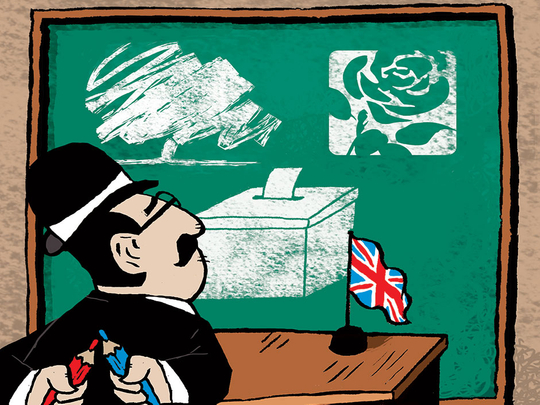
Very occasionally in politics things turn out to be as they seem. This may prove true of Britain’s election campaign. The players are waiting anxiously for something to happen — for the tide to break right for Prime Minister David Cameron’s Conservatives or left for Ed Miliband’s Labour. The voters are looking ever more stubborn in a determination not to confer governing authority on either of the United Kingdom’s two big parties.
There is still time enough for what Donald Rumsfeld famously called unknown unknowns to disturb the ground, but the cement is hardening. The ballot paper for May 7 does not include a box marked “hung parliament” or “coalition”, but the polls, resolutely flat for months, suggest stalemate is the settled choice of the nation. I cannot recall when voters last showed such studied indifference to the clamour and clatter of an election campaign.
Yet, there have been some things to learn from the past few weeks. The goal of modern political campaigning is to shut out real people while conveying precisely the opposite impression on the television news. Everything is controlled and choreographed, with loyal activists dressed down as “floating voters”. And yet, for all this process of sterilisation, something of the character of the players finds a way through. Remember Hillary Clinton versus Barack Obama in the 2008 US presidential primaries?
The adage has it that politicians campaign in poetry and govern in prose. Well, the first thing to say is that Cameron has been having some trouble with his iambic pentameters. Stepping out of 10 Downing Street, he looks every inch the Prime Minister. The absence of an organising purpose is camouflaged by abundant self-confidence and the hustle and bustle of the prime ministerial schedule. On the campaign trail, though, the lack of conviction shines through. Cameron exudes detachment — almost irritation that he should be made to go through all this just to renew his lease on No 10.
Relatively speaking, Miliband has had the better of the contest — though the “relatively” is an important qualification. The Labour leader started from a low base. He has long been caricatured and vilified by a hostile media. The campaign has shown him a sentient human being. Unsurprisingly, voters have been pleasantly surprised. Whatever one thinks of his old-fashioned Leftist romanticism, Miliband looks a politician ready to fight his corner.
A second thing to say about the campaign is that, if the polls are right, politicians of all colours will struggle to come to terms with a result that will more likely deliver a minority government or multi-party coalition than an outright majority or a neat arrangement such as Cameron’s present coalition with Nick Clegg’s Liberal Democrats.
There is nothing inherently unstable about minority or multi-party government. Canada, New Zealand or the majority of European states, prosper without a political culture of winner-takes-all. But the British political mindset, impervious to experience elsewhere, mistakes majoritarianism for good governance. Anything else is chaos. The Cameron-Clegg coalition says otherwise, but is widely dismissed as the exception that proves the rule.
The third lesson is that the Conservatives and Labour are hopelessly unprepared for the post-election constitutional challenge of holding together a splintering UK. Voters elsewhere may be equivocal, but the Scots have made up their minds. Having lost the independence referendum, the Scottish National Party (SNP) is on course for a stunning victory on May 7, largely at the expense of Labour. The SNP could well displace the Liberal Democrats as the third largest party at Westminster.
The last time an overtly separatist party won a majority of seats in one of the nations of the union was 1918, when Sinn Fein grabbed two-thirds of those in Ireland. The rest, as they say, was uncomfortable history. Hopefully, Britain has moved beyond civil wars, but the strains on the union are no less real. What will be demanded of a new government is a constitutional settlement that at once meets Scottish aspirations for home rule, protects the essential fabric of the union and is fair to the other nations of the UK. Messrs Cameron and Miliband have been all but silent.
A fourth observation is that in spite of the overheated rhetoric of the campaign trail, the gap between Labour and Conservatives on economic management is smaller than it seems. True, Miliband is needlessly hostile towards much of the business community and would take longer than the Conservatives to eliminate the fiscal deficit. But, as Francois Hollande, the French President, could attest, realities quite quickly impose themselves on Left-leaning governments. As for Cameron, his pledge to balance the books by 2018 has been rendered incredible by a slew of spending and tax pledges.
The fifth lesson is deeply dispiriting: Tory-or Labour-led Britain will retreat from the world. Cameron’s promised referendum could wrench Britain out of the European Union (EU), his immigration rules would shut out the hard working and the talented from abroad. As for Miliband, he sees the world as largely irrelevant to his grand project to build a fairer society. Both parties will annoy Washington by cutting defence spending. But then, these days, Britain’s voters are as mistrustful of foreign adventures as they are of the political leaders standing for election on May 7.
— Financial Times










